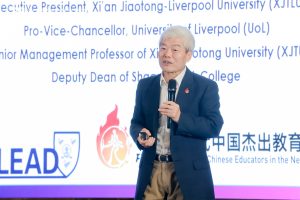活动详情
日期: 2024-07-05
时间: 10:00-11:00
地点: SA236
线上平台: please join us with Tencent Meeting (ID:484-158-257)
主讲人:Prof. Yufei Huang
主题:reguloGPT: Harnessing GPT for End-to-End Knowledge Graph Construction of Molecular Regulatory Pathways
活动简介
Molecular Regulatory Pathways (MRPs)are crucial for understanding biological functions. Knowledge Graphs (KGs)have become vital in organizing and analyzing MRPs, providing structured representations of complex biological interactions.Current tools for mining KGs from biomedical literature are inadequate in capturing complex, hierarchical relationships and contextual information about MRPs.Large Language Models (LLMs)like GPT-4 offer a promising solution with advanced capabilities to decipher the intricate nuances of language. However, their potential for end-to-end KG construction, particularly for MRPs, remains largely unexplored. We present reguloGPT, a novel GPT- 4-based in-context learning prompt designed for an end-to-end extraction of regulatory graphs and context from a sentence that describes regulatory interactions. Our reguloGPT approach introduces a context- aware relational graph that effectively embodies the hierarchical structure of MRPs and resolves semantic inconsistencies by embedding context directly within relational edges. We created a benchmark dataset including 400 annotated PubMed titles on N6-methyladenosine (m6A)regulations. Rigorous evaluation of reguloGPT on the benchmark dataset demonstrated marked improvement over existing algorithms.We further developed a novel G-Eval scheme, leveraging GPT-4 for annotation-free performance evaluation and demonstrated its agreement with traditional annotation-based evaluations. Lastly, we constructed m6A-KG by utilising reguloGPT to m6A-related titles and demonstrated its utility in elucidating m6A's regulatory mechanisms of cancer phenotypes across various cancers. These results underscore reguloGPT's transformative potential for extracting biological knowledge from the literature
主讲人
Yufei Huang received his Ph.D.in Electrical and Computer Engineering in 2001 from the State University of New York at Stony Brook. He is currently a Professor at the Department of Medicine, School of Medicine, University of Pittsburgh and Leader in AI for Cancer Research at UMPC Hillman Cancer Center. He also holds joint appointments at the Electrical and Computer Engineering and Pharmaceutical Sciences at the University of Pittsburgh. Prior to that, he was Professor and Associate Chair of Research of the Department of Electrical and Computer Engineering at the University of Texas at San Antonio (UTSA), and an adjunct professor at the Department of Population Health Science at the University of Texas Health San Antonio. He has been a visiting professor at the Center of Bioinformatics, Harvard Center for Neurodegeneration & Repair.
Dr. Huang has multi-disciplinary expertise in cancer genomics, clinical informatics, and AI/machine learning. His current research focuses on developing AI and informatics tools for m6A mRNA methylation analysis and spatially resolved single-cell transcriptomics and using these tools to study cancer and cancer viruses. He was a recipient of the National Science Foundation (NSF) CAREER Award, UTSA Presidential Achievement Award on Research Excellence, UPMC Hillman Senior Fellow for Innovative Cancer Research, and multiple best paper awards, including the Best Paper Award of IEEE Signal Processing Magazine. His research has been supported by NSF, NIH, Air Force Office of Scientific Research, Army Research Lab, Department of Defense, and Qatar National Research Fund. He is a member of the National Cancer Institute Informatics (NCI) Technology for Cancer Research Program and an associate member of the NCI Cancer System Biology Consortium. He has served in the role of Associate Editor for multiple journals including IEEE Reviews in Biomedical Engineering, Frontiers Genetics, BMC Systems Biology, and Neurocomputing. Currently, he serves as the Chair of the IEEE Engineering in Medicine and Biology Society, Biomedical and Health Informatics Technical Committee. He was the General Chair of the 2023 IEEE-EMBS International Conference on Biomedical Informatics (BHI 2023) and Technical Committee Co-Chair of the 2022 IEEE International Conference on Bioinformatics and Biomedicine.







